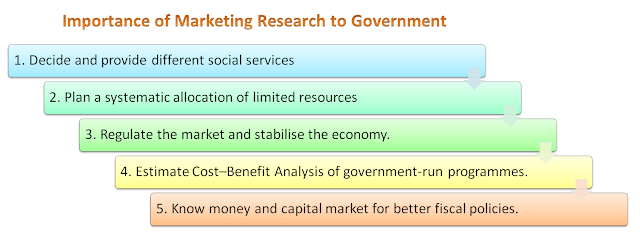How Important Market Research Is to the Public Sector
Market research plays a significant role in enabling the government to fulfill its regulatory obligations. Information about the market is supplied regularly to the government, which uses it to better monitor, plan, coordinate, and regulate the economy within its sphere of influence. When it comes to understanding market dynamics, the government relies on the insights supplied by MR. This comprehension is then used to activities such as policymaking, priority setting, resource allocation, social service delivery, market regulation, economic stability, and other related activities.
- The government may benefit in a number of ways from marketing research, as seen below.
- Set policy and provide specialized social assistance.
- Make a strategy to divide up the limited supplies in a fair and efficient way.
- Regulation is necessary to keep the economy stable and the market functioning smoothly.
- Value the Expenses Against the Benefits A critical analysis of state operations.
A deeper understanding of finance and the capital market might lead to more effective fiscal policymaking.
Let's go deeper into the specifics of the aforementioned points that show how market research helps the government.
1. Assistance Programs
When we talk about "social services," we're actually referring to a vast range of government programs whose overarching goal is to boost people's happiness and quality of life in general.
The following categories of social services can benefit from marketing research and be better informed by the government:
- Governments can utilize MR to determine how many public universities, hospitals, colleges, schools, libraries, and other institutions are required to meet the needs of the people living in their area.
- It's also useful for estimating how much money is needed to launch, maintain, manage, and grow these types of public benefit organizations.
- It also facilitates the opening of public gardens and sports playgrounds, the implementation of family welfare programs, the management of leisure centers, and so on by government agencies.
2. Dispersal of Resources
Essential resources are becoming more scarce and expensive to acquire on a daily basis. As the world's population and level of living have increased rapidly in recent years, there has been a corresponding increase in the demand for limited resources. Allocation of these precious assets must adhere to a strict priority list, and they must be used as efficiently as feasible. As a result, the government must take the reins, take charge, and strategically allocate resources to prevent their inefficient use, misuse, and waste.
The following are some of the ways in which the government may benefit from a marketing research in allocating resources more effectively and efficiently:
- The MR system provides crucial data to the government on the distribution of goods, the consumption habits of the populace, and the distribution of personal income.
- After conducting thorough research and analysis of such data, the government then determines the priorities of the people and formulates a strategy for allocating resources to suit societal interests in accordance with this decision.
- It determines how much of a particular resource should be spent on various governmental and non-governmental activities, such as policing, healthcare, manufacturing, retail trade, public transit, agriculture, and the like.
3. Thirdly, Market Controls
The market is the nerve center for many types of business transactions. A nation's economy and financial system can only thrive over time if it operates fairly, securely, and to its fullest capacity. Because of the disruption, it may create to the economy, an unchecked market is a major security risk. This is why governmental oversight is required.
The government organizations responsible for market regulation must find a happy medium between stifling competition and micromanaging the economy. It is important that market regulation is neither too easy nor too complex and rigid. The control mechanism should be crafted in such a manner that it protects the interests of all entities that are participating in and contributing to the growth of the market, while also contributing to the growth of market by assisting to facilitate its expansion.
The government needs an ongoing supply of accurate data in order to evaluate and regulate the market effectively. The government is responsible for a variety of tasks, but one of the most crucial is ensuring a constant supply of goods for the general public to buy. The government has an obligation to prevent the illegal stockpiling or hoarding of products for the aim of creating scarcity and artificially inflating the prices of those products on the market. Stopping the expansion of the illicit market is also essential. That it takes appropriate measures to guarantee the orderly functioning of the market is of paramount importance. When the market is unchecked, enterprises with questionable morals have a better chance of growing, which can slow progress and reduce competition. Therefore, regulation plays a critical role in maintaining economic stability.
Because of the marketing study, the government has the opportunity to take the following steps:
- Examine the existing and future demand for commodities, and look into whether or not certain goods may be exported.
- Set a limit on how much inventory will be maintained,
- Locate the problems that have emerged due to the shortage of products and other resources, and then figure out how to fix them.
- Fourth, a review of the associated costs and benefits
4. A cost-benefit analysis
A cost-benefit analysis, or CBA, is a method of weighing the costs and advantages of a potential investment in a certain course of action in order to reach a conclusion on whether or not the expenditure of those funds is warranted.
The CBA can be used as a measuring stick or analytical tool to assess the viability of a proposed course of action. It might help you decide if you should keep moving forward with a strategy or call it quits.
The government can use marketing research to estimate the cost-benefit analysis of a project, plan, or program in several different methods, including the ones listed below.
- It examines whether the benefits acquired by the public through the operation of different social welfare initiatives, plans, and programs were adequate to justify the amount of money spent by the government on such activities.
- We might argue that the government is efficient in its workings if it was able to cut the amount of money it spent on any social welfare program while still being effective in giving the maximum potential benefit to the people.
- Utilizing a methodology like CBA, or MR may help assess the relative success or failure of different government projects.
5 Financial and Capital Markets
The government might benefit from a marketing research in numerous sectors of the money market and the capital market.
- When the government has a firm grasp of the financial markets, it has access to the information and insight it needs to fine-tune its monetary and fiscal policies.
- Investment, infrastructure development, and the growth of a wide range of economic subsectors are all bolstered by market-driven economic policies. In the long run, positive market movements like this help a country strengthen its economy and grow its influence throughout the world.
Therefore, the previous discussion has proven that marketing research is important to the state.






